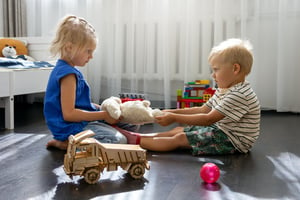 If you’re got school-aged children who try to outdo one another, you’ll be relieved to learn that the Mayo Clinic calls sibling rivalry a “natural part of growing up.” They note how children closer in age may engage in this more than ones spaced further apart (although this isn’t always true) and that kids of the same gender may be more competitive with one another than those from the opposite gender. Again, this isn’t always the case.
If you’re got school-aged children who try to outdo one another, you’ll be relieved to learn that the Mayo Clinic calls sibling rivalry a “natural part of growing up.” They note how children closer in age may engage in this more than ones spaced further apart (although this isn’t always true) and that kids of the same gender may be more competitive with one another than those from the opposite gender. Again, this isn’t always the case.
Middle children in the family may act out to secure their place in the family dynamic while kids of divorced parents may quarrel with siblings to get parental attention. Overall, sibling rivalry “typically peaks between ages 10 and 15”—but, again, not always.
If sibling rivalry exists in your household, what should you do?
Avoid Making Comparisons
According to the Child Development Institute, a key technique is to avoid making comparisons between children. For example, don’t say something like this: “I don’t understand it. When Johnny was his age, he could already tie his shoes.” Instead, treat each child as a unique person and focus on individual expectations for each one.
Pick Your Battles
 When it’s reasonable to do so, let the children settle their own disputes. To help make this more doable, set ground rules, such as no hitting — either through physical fighting or figuratively when one child, for example, is better able to articulate frustration.
When it’s reasonable to do so, let the children settle their own disputes. To help make this more doable, set ground rules, such as no hitting — either through physical fighting or figuratively when one child, for example, is better able to articulate frustration.
Sometimes, parents will need to mediate, though, so don’t hesitate if that’s the best course. Use this as an occasion to teach them how to manage disagreements constructively—a skill that will come in handy throughout life.
Let Them Express Their Feelings
Don’t try to dismiss your children’s feelings of anger. Feeling resentful is part of being human and kids need help learning how to navigate situations that trigger this emotion. According to Very Well Family, it can help if you describe your family as a team and explain that learning to get along will help the entire family.
Teach your children how to specifically state what upsets them instead of merely complaining about a sibling. “It’s my turn to choose a game,” for example, is more constructive than “She always gets to pick what we play!” Listen to both sides and encourage your children to brainstorm solutions. Ask them to consider the issue from the other person’s perspective, too.
to choose a game,” for example, is more constructive than “She always gets to pick what we play!” Listen to both sides and encourage your children to brainstorm solutions. Ask them to consider the issue from the other person’s perspective, too.
Lead by Example
Also, model your own problem-solving skills with your spouse, friends, and other adults. Children watch what parents do and they can learn plenty of lessons from what they observe.
The Center for Parenting Education takes a different angle with this piece of advice: consider how your parents handled sibling rivalry and how that may affect your parenting style. If you remember them saying, “Just cut it out. I can’t deal with this” or “I don’t care who started it. I’ll punish both of you,” then you may respond in similar ways without realizing it. It can help to consciously consider how you’re addressing sibling rivalry and if it’s really the best strategy.
 Also, don’t have unrealistic expectations. Some sibling rivalry is going to occur. It’s just a matter of degree. Plus, bickering can offer opportunities for kids to learn negotiating techniques and other life skills. So, give up the idea of a perfectly harmonious household 24/7, and consider which of these techniques will work best for your family.
Also, don’t have unrealistic expectations. Some sibling rivalry is going to occur. It’s just a matter of degree. Plus, bickering can offer opportunities for kids to learn negotiating techniques and other life skills. So, give up the idea of a perfectly harmonious household 24/7, and consider which of these techniques will work best for your family.
As a final tip, the Center recommends that you find a good middle ground between rigid strictness and loose permissiveness. Strict discipline can in fact model aggressiveness for children while too much permissiveness may cause some children to act out to get attention. As a healthy middle ground, respect individual needs and foster cooperation rather than competitiveness in a loving family environment.








